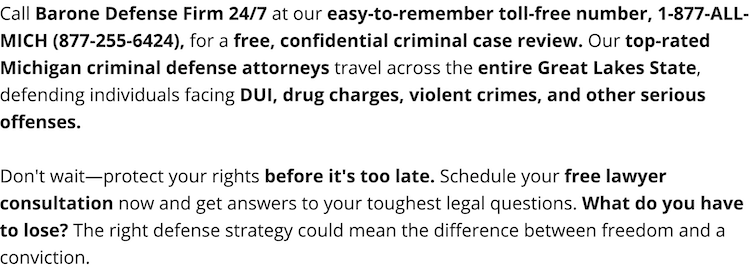Birmingham License After a Third Offense DUI
The third offense is quite difficult to understand without seeing the dates of the person’s prior offenses. In Michigan, the penalties can be automatic based on time differences. It is possible that on a third offense drunk driving, the person only suffers a first offense drunk driving sanction. However, if one or both of their priors are within seven years, the person’s driver’s license can be revoked for a period of one year.
When the two priors or some other action previously caused them to have their license revoked and that revocation came within seven years, the revocation of the third offense could be a five-year revocation. A revocation in the state of Michigan means no driving.
There is no availability of a license after a Birmingham third offense DUI, restricted license, or hardship license of any kind unless a person goes through a sobriety court. The Oakland County Circuit does not generally offer a sobriety program.
Receiving Penalties
Until there is a conviction entered, there is no driver sanction barring an implied consent violation. That is a separate process through the Secretary of State that can be handled before, during, or after the court case. Generally, penalties take place a little before the court case is resolved which could lead to a one-year suspension of the person’s driver’s license after a Birmingham third offense DUI. In that case, there are driving privileges available. As far as the court case, no punishments are put down until the case is resolved and there is a sentencing.
Bond
However, when a person is placed on bond, the period of time during which their case is decided can have conditions that in some ways feel like a punishment. One of these conditions is to not drink or do drugs. The courts can offer an order of testing to ensure that the person is not using alcohol or drugs. The testing on the third offense is more substantial and severe than a first or second offense.
Ankle Monitoring Devices
Many times people are placed on a Secure Continuous Remote Alcohol Monitor (SCRAM) tether ankle monitor that is uncomfortable and can cause chafing, rashes, and sores. The person must pay about $450 a month for the device. More substantial testing conditions can be put into place. The person can be ordered to go to inpatient treatment, intensive outpatient treatment, or multiple AA sessions each week as part of the bond.
If they fail to do that, they sit in jail waiting for their case to be heard. Some of these are corrective measures given at a sentencing and can be started at the time a person is charged with a third offense drunk driving. In addition, they can be ordered to pay large amounts of cash to secure a bond. It is not unheard of in some of the courts to have $10,000 cash bond to be released; put on the SCRAM tether, and attend alcohol counseling. A person could also have restrictions on their license after a Birmingham third offense DUI.
Applying for a Restricted License
If a person is just charged with a third offense DUI in Birmingham, they can continue to drive on their license as before. The problem arises when a person is convicted of the third offense DUI. There is no hardship petition except for an implied consent. The person can get a restricted license. However, with a revocation, the person cannot get a restricted license unless there is a sobriety court available. That does not generally happen in Oakland County at the circuit court level.
Challenging the Suspension of a License
It is difficult to challenge the suspension of a license after a Birmingham third offense DUI because everything is automatic at the Secretary of State in Michigan. The judges do not have the ability to get involved in any kind of license sanction outside of an implied consent violation. Instead, the charge is whatever was entered.
When the conviction is entered, that is what the Secretary of State automatically uses to determine punishment. When the Secretary of State receives a third offense charge, they look to see the dates of the prior convictions. They identify the number of priors and the status of the license at the time the third conviction was entered.
They verify whether it is a first offense sanction, a one-year revocation, or a five-year revocation based on their information. The judges do not have any leeway with that. The only way to go about getting any kind of license on a third offense is to participate in a sobriety court and that is generally not an option at the Oakland County Circuit Court level.
 Barone Defense Firm Home
Barone Defense Firm Home




















